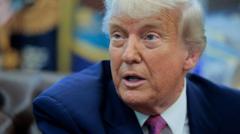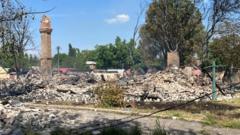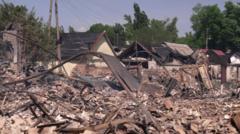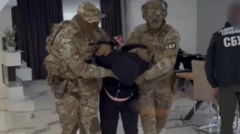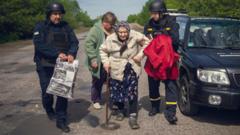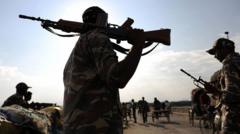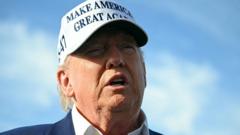In a significant development for Ukraine’s defense strategy, Chancellor Friedrich Merz of Germany has pledged assistance in producing long-range missiles for Ukraine to defend against Russian aggression. During a press conference in Berlin with Ukrainian President Volodymyr Zelensky, Merz emphasized the urgency of their military cooperation while addressing the need for lifting restrictions on weapon range—a move that could escalate tensions with Moscow.
Chancellor of Germany Vows Support for Ukraine’s Long-Range Missile Production
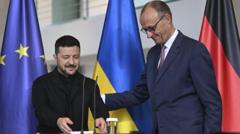
Chancellor of Germany Vows Support for Ukraine’s Long-Range Missile Production
Germany’s new chancellor announces military support for Ukraine amidst ongoing conflict.
Germany's new chancellor, Frederick Merz, has made headlines by offering significant military support to Ukraine. Meeting with President Volodymyr Zelensky in Berlin, he promised collaboration in the production of long-range missiles, vital for enhancing Ukraine’s defense capabilities against ongoing Russian attacks. Merz stated that details are to remain private, though he indicated a memorandum of understanding concerning missile development would be signed later by both nations' defense ministers.
Despite not naming the Taurus missiles specifically in his announcement, Merz pointed out the absence of range restrictions for the weaponry provided to Ukraine, which can now reach 500 kilometers (310 miles) into Russian territory. The Kremlin has expressed grave concerns regarding the implications of lifting such restrictions, ominously hinting that it could hinder future peace negotiations. Nevertheless, Merz maintains that this policy change aligns with decisions made by Western allies months earlier.
Taking office earlier this month, Merz seeks to position himself as a proactive supporter of Ukraine, reflecting a significant departure from his predecessor, Olaf Scholz. He asserted that Germany would back Ukraine's military efforts as long as necessary and warned Russia that its inaction in negotiations would result in severe repercussions.
In a broader context, Zelensky called for a trilateral negotiation framework involving Donald Trump and Vladimir Putin, while suggesting flexibility in the format of discussions. Meanwhile, Russian Foreign Minister Sergei Lavrov has indicated readiness for a second round of peace talks, proposing a memorandum outlining Russia's peace conditions.
Despite these diplomatic overtures, fighting on the ground is intensifying, with Ukraine reporting considerable drone barrages against Russian targets. The conflict, which marks its fourth year, continues to claim substantial casualties and devastate populations, leaving a significant portion of Ukraine under Russian control.
As negotiations unfold, both nations remain deeply entrenched in their positions, with military actions continuing to escalate, hindering the potential for peace amid growing international scrutiny.
Despite not naming the Taurus missiles specifically in his announcement, Merz pointed out the absence of range restrictions for the weaponry provided to Ukraine, which can now reach 500 kilometers (310 miles) into Russian territory. The Kremlin has expressed grave concerns regarding the implications of lifting such restrictions, ominously hinting that it could hinder future peace negotiations. Nevertheless, Merz maintains that this policy change aligns with decisions made by Western allies months earlier.
Taking office earlier this month, Merz seeks to position himself as a proactive supporter of Ukraine, reflecting a significant departure from his predecessor, Olaf Scholz. He asserted that Germany would back Ukraine's military efforts as long as necessary and warned Russia that its inaction in negotiations would result in severe repercussions.
In a broader context, Zelensky called for a trilateral negotiation framework involving Donald Trump and Vladimir Putin, while suggesting flexibility in the format of discussions. Meanwhile, Russian Foreign Minister Sergei Lavrov has indicated readiness for a second round of peace talks, proposing a memorandum outlining Russia's peace conditions.
Despite these diplomatic overtures, fighting on the ground is intensifying, with Ukraine reporting considerable drone barrages against Russian targets. The conflict, which marks its fourth year, continues to claim substantial casualties and devastate populations, leaving a significant portion of Ukraine under Russian control.
As negotiations unfold, both nations remain deeply entrenched in their positions, with military actions continuing to escalate, hindering the potential for peace amid growing international scrutiny.


